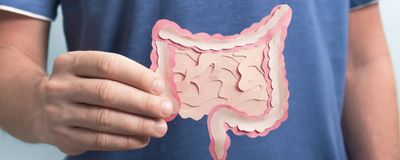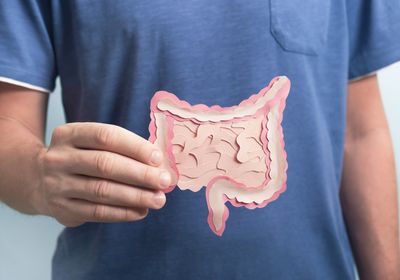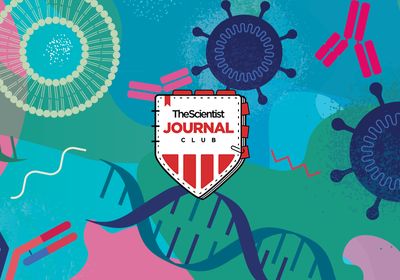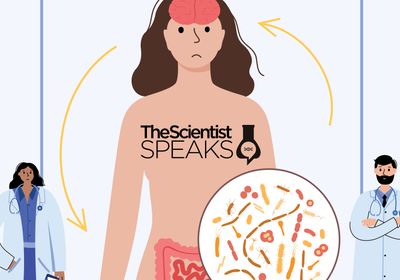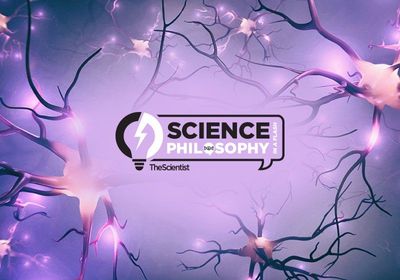ABOVE: © ISTOCK.COM, ELENA NECHAEVA
Trillions of bacteria living in the human gut regulate the health of the body, but a disrupted microbiome can lead to a slew of diseases, including inflammatory bowel disease, multiple sclerosis, and type 2 diabetes. Now, metagenomics researcher Oluf Pedersen and his colleagues at the University of Copenhagen in Denmark have found that the gut microbiome could also contribute to the eating disorder anorexia nervosa, potentially by altering gene expression in the brain.
Studies have previously linked the microbiome to anorexia (1,2), but Pedersen and his colleagues wanted to pin down the exact mechanisms. “We can manipulate the gut microbiome, and that opens a potential avenue for a novel treatment,” said Pedersen, whose team published their findings in Nature Microbiology (3).
See “Genetic Study Points to Metabolic Roots of Anorexia Nervosa”
The team began by comparing stool samples from 70 healthy women and 77 women with anorexia. “There were massive changes in the abundance of bacteria,” Pedersen said, including 27 bacteria that were elevated in anorexic participants and 43 that were depleted. They also found differences in the expression of bacterial genes and in the blood levels of bacterial metabolites, which can affect human physiology. For example, the anorexic group showed an increase in indole-3-propionic acid, which slows down the passage of food and reduces feelings of hunger.
Comparing bacteria, however, is not enough to pin down their effects. To test whether the microbiome directly affected symptoms, the team transplanted fecal samples from three anorexic and three healthy participants into mice lacking gut microbiomes. The mice were then put on restrictive diets to mimic anorexic eating patterns. Those with anorexic microbiomes experienced a quicker drop in weight and put weight back on more slowly, indicating that the anorexic microbiome was conducive to weight loss.
20 years ago, we wouldn’t have thought this possible.
—Jochen Seitz, RWTH Aachen University
“The highlight for sure was the transfer to germ-free mice,” said Jochen Seitz, who researches anorexia at RWTH Aachen University and was not involved with the work. There must be something in the transplanted fecal samples, namely the microbiome, that enhanced the symptoms, he said. “This proves that there is a causal aspect to it.”
The team then analyzed gene expression in the mice. In mice with anorexic microbiomes, they found increased expression of the appetite suppressor genes Bdnf and Cartpt in the hypothalamus, the brain’s appetite control center. “Browning” genes that convert white fat that stores energy into brown fat that burns energy to heat the body were also upregulated in fat tissue.
See “Researchers Explore the Genetics of Eating Disorders”
These changes may explain why the mice lost weight and struggled to regain it, providing a possible mechanism for how the microbiome seemingly intensifies anorexia symptoms. However, Seitz said that the increased expression of the “browning” genes may have been a consequence of weight loss and not a cause, because thinner mice might produce more brown fat to better regulate body temperature.
Seitz also pointed out that the study did not control for diet and exercise, which are known to alter the microbiome. This means that it could be the anorexic symptoms that initially set off the microbiome changes, not the other way around. Pedersen thinks that the microbiome is probably not involved initially but could be the “evil engine” that keeps the disease running.
He is now optimistic about new treatments. “Clinical centers around the world will likely start considering clinical trials where they first eradicate the disrupted gut microbiome in anorexic cases with antibiotics, and then follow with weekly fecal microbiome transplants for months,” he said.
Such potential treatment options show how new microbiome research still is, said Seitz. “20 years ago, we wouldn’t have thought this possible.”
See “Gut Microbiomes Offer Insights into Chronic Fatigue Syndrome”
References:
- I. Mack et al., “Weight gain in anorexia nervosa does not ameliorate the faecal microbiota, branched chain fatty acid profiles and gastrointestinal complaints,” Sci Rep, 6:26752, 2016.
- T. Hata et al., “The Gut Microbiome Derived From Anorexia Nervosa Patients Impairs Weight Gain and Behavioral Performance in Female Mice,” Endocrinology, 160(10):2441–2452, 2019.
- Y. Fan et al., “The gut microbiota contributes to the pathogenesis of anorexia nervosa in humans and mice,” Nat Microbiol, ISSN 2058-5276, 2023.
